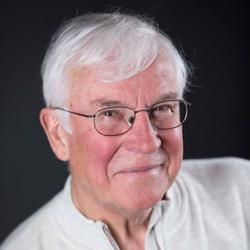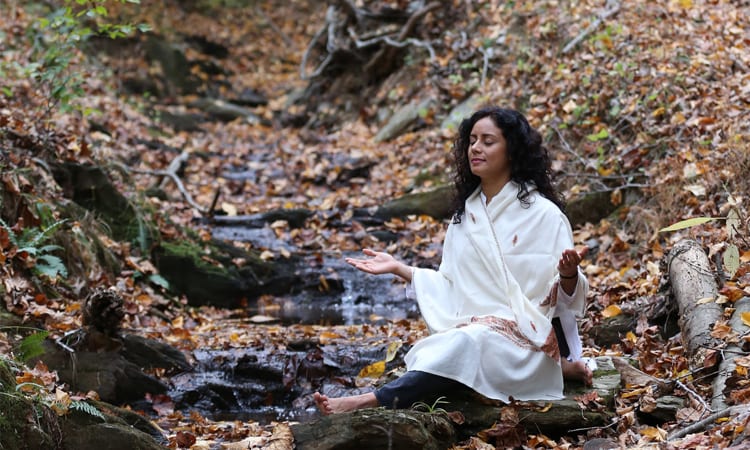
How many times have we been encouraged, in the name of mindfulness, to live in the present moment? With the pace of modern life steadily quickening and the distractions multiplying, being present is seemingly easier said than done. Thankfully, in the following interview, Michael Lee, founder of Phoenix Rising Yoga Therapy, offered us a protocol for how to practice mindfulness in everyday life.
Yogaville: You’re presenting a workshop on the topic of navigating life change. Why is change sometimes difficult for human beings?
Michael: I think, and this is just a theory that has come to me over the years, but I think that we try to solve the problems of the mind with our minds. I think there’s a lot of conversation about this in the Yoga world and I know Swami Satchidananda was big on being mindful of how much we use the mind to solve life problems. The reality is that it’s not a very reliable instrument in that regard. It’s great for other pursuits, such as figuring things out intellectually, solving engineering or mathematical problems, or determining how to get from A to B. There’s a lot of really great stuff that our mind is a very useful tool for.
But when it comes to life—life is much more complex—life involves the body-mind. It involves the visceral sense of self as well as the thinking sense of self. So it seems to me that change is difficult because we tend to be disconnected from our physical experience of life and we’re not allowing that part of our life to inform us as to what is really happening. If we’re going to make change of any kind in any direction, the first and foremost important thing is to know where we are—to ask ourselves, “What’s happening now? Where am I in my life? What’s working? What other things am I doing that are making a difference? How are my relationships? What am I doing to create the kind of relationships that I have?” and to be really aware of that.
So I think part of change, and what makes it difficult for us, is that we don’t engage all of our faculties, particularly the body and a visceral sense of life. When we do, I think we can better tune into what is going on. I think the other thing is that when we spend a lot of time in our minds, we’re projecting towards the future or having a lot of regrets about all the things that have passed. We’re concerned, “How is this going to work out” and then the wheels of our minds spin around that issue, as opposed to, “What’s really happening here?”
Sometimes we might experience an event and it might immediately take us back to all the things that we’ve experienced in the past. It might even trigger trauma from the past. That’s the naturally occurring process if we don’t have another mechanism for short-circuiting that to really get present now. The thing with Yoga and meditation is that they really bring us into a present sense of awareness and into a state of being fully with ourselves in the moment, moment-to-moment, and that’s a real gift. There are not a lot of us in this world that really have a handle on how to do that.
That’s pretty much what I’ve made my life’s work about. What are the ways that we can really engage people in some of the processes that will firstly bring awareness and then help them create the kind of changes they want in their life. And let’s face it; we all want more peace, less suffering, and more joy. You ask anybody, and those are almost universal answers to “What do you want in life?” If you want those things, there are ways to change your life, to move it in that direction, and quite often those changes aren’t all that big, they’re quite simple.
But to get the necessary awareness and the necessary embodied, visceral experience to really know that, we have to learn how to listen to and trust our bodies, to trust our inner wisdom, as well as what goes on in our mind. So that’s a very long answer to a very simple question, but there it is!
Yogaville: You mentioned tuning in to your body to better understand what’s going on in a situation and then letting your body inform your choices. Could you explain further?
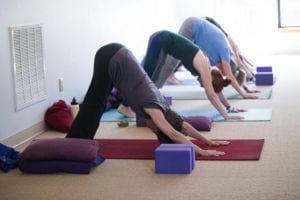
Michael encourages a Yoga practice to help tune into the body.
Michael: Choice comes a little later on. There are certain elements that come before that, but that’s an important point. Yeah, it definitely will help inform our choices. But before we can make choices, we’ve got to have awareness, and we’ve got to be able to accept that awareness. That’s where a lot of us get hung up from the get-go, right at that point. First of all, we don’t have the awareness, because of what I mentioned before about all the wheels spinning, so our body’s really helpful in getting that.
Then comes acceptance. If I’m standing under a cold shower, there’s any number of things I could be doing there. I could be reacting like, “Oh my goodness, this is so cold! I can’t stand it!” and running through all the things in my head and making a big deal out of it. Or, I could just be stand there and say, “This is just cold water. That’s all that’s happening now. It’s just cold water on my body.”
That in fact, is a choice to experience this moment. You know the famous quote of Viktor Frankl’s? He endured years and years of deprivation, hardship, torture, you name it, as a prisoner of war, and he said he kept alive and he kept his sanity by simply taking command of how he was going to experience each moment. He said he didn’t have any control over what was being done to him, but he did have control over how he was choosing to experience it and what kind of things he was bringing into his mind while it was happening.
That’s powerful. And basically, the little steps will help us get there. Tuning into our bodies through a Yoga practice is one of the ways. You start paying attention to your breath, you start paying attention to what’s happening now to my body as I move into this posture, and as you consistently practice over time, or better yet, you have a Yoga therapist working with you who can actually also coach you in that process and help you engage at a deeper level. Then you’re going to get a lot more awareness and you’re also going to get better at being present with what is.
And then to come to the other point about choice: when you come to the various crossroads and when you get to that choice point, oftentimes we have very limited choices. We think it’s either right or wrong, white or black, this way or that way, no in-between. And in fact there are many in-betweens. Also, depending on the situation, some choices might work today, but won’t work tomorrow. Some choices work in this situation, but not in that situation. It’s not like we have an owner’s manual for life and we can just follow the rules. Life’s too tricky for that—it doesn’t work like that. There are going to be situations and applications where we have to decide. That’s called discernment, another skill. And again, that discernment comes from awareness—finely tuned awareness. The more finely tuned our awareness, the greater the discernment, and the more choices.
Yogaville: So it seems like it all comes down to awareness then! You talked about making the changes we want in life. How can we make changes that are more in harmony with the divine nature, or higher Self, in all of us?
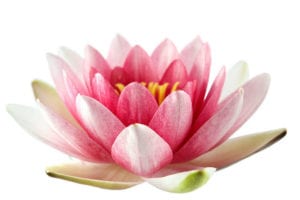
Michael: Great question! I think it’s a natural process, like a flower blooming. We all want to give off our fragrance, but there are things in the way of it. It’s really all about removing the obstacles. I think once the obstacles are removed, it’s almost like a natural state of being.
We’re born into the world with a lot of perfection. There are lots of things right when we’re born, but then we get shaped by the world—that’s how the world is, you know? The Buddha said, “Suffering is a part of the journey,” and it’s so true. We have imperfect parents, and maybe those imperfect parents do things that later they’ll regret, but at the time, they do them anyway. That affects us, so we learn to adapt. Our desire for survival—the reptilian brain—takes over so that we survive. It builds up a whole lot of protective measures to make sure that it happens, but in the process, it cuts us off and it puts blocks in the way of being really with our true nature—our divine essence. So slowly, over time, we have to work away at that.
The blocks are the things that happen in our head—all the wants and desires we have. “As soon as I get a new house, I’ll be happy.” But will you be happy? No, we know that. A new house is not going to make you happy. A lot of money is not going to make you happy. A new job is not going to make you happy. But we have the illusion that it will. While that illusion is feeding us, while that illusion is motivating us, it’s very difficult to be so present to life that we can make the kind of changes and move in the kind of directions that get us to where we really want to go. So we have to learn to recognize the obstacles, and we do that through awareness, and we get awareness through various practices and processes that are designed to that purpose.
Now sometimes it’s not going to be a straight line. There are going to be ups and downs. There are going to be times where we slip up. We can’t get it right all the time. We’re going to make mistakes, and that’s where another element comes in, and it’s really critical to the process of self-change—that’s self-compassion. We’ve got to be compassionate with ourselves and love ourselves. We’ve got to know that we’re not perfect, and that’s perfectly okay. That’s the beautiful thing about Swami Satchidananda. He just loved people unconditionally. There were no barriers to that. I think a lot of people who were around him took that to heart and learned to do that themselves. That’s a really beautiful gift to give yourself—to give yourself love and compassion, to accept your humanness. And when you don’t get it right, to say, “Okay, I’ve got another shot at this, let me try again. “
Yogaville: The title, or the subtitle, of your upcoming program is: Suffering is Optional. Is self-compassion a way realize that?
Michael: Absolutely. Things are going to happen in life, there’s no question about it. I’m going to have setbacks, I’m going to have disappointments, there are going to be things that happen in life that I don’t like. But how I choose to be with that is a choice; it’s not a given. I don’t have to suffer, you know?
In some ways, I think the Buddha got it right when he said that impermanence is the cause of suffering. Because everything is impermanent, because nothing is not changing, everything is always changing. That’s just a reality. We get attached to keeping things the way they are or wanting them to be how they’re not. There’s attachment to that, and it makes struggle, and it makes suffering. So when some event happens that’s not so good—or even disastrous—we’re really upset that it happened, but there’s not much we can do. It happened. So, how do we choose to be with that? Where do we direct the energy? Where do we direct our attention? And how do we develop the resilience within ourselves to be able to do that?
Some people can do that really well. The masters, the saints, and the sages, had mastered that aspect of life—they could be with whatever happened and it didn’t make a whole lot of difference. They were still happy on the inside. So the question I often ask is, “What can I learn from that, and how can I bring those things into my own life?” One of the things that I think makes the difference is intentionality. For example, every day after I do my practice in the morning, I take a moment to tune in and ask myself, “How do I want to show up in the world today? What part of me do I want to bring to life?” and then set about doing that. It’s a little different than just waiting for something to happen and reacting. I can do that, too; we all can.
Yogaville: What a powerful practice! So is there a particular practice that you would recommend to others to help them on their spiritual journey? You’ve placed emphasis on the importance of awareness. What would you suggest for those that are looking to establish a practice?
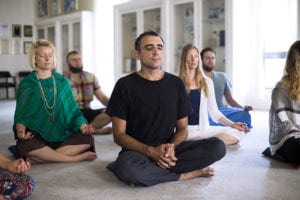
Your practice is a time of being, not doing.
Michael: I think it’s important that we each design a practice that works for us. Different practices for different people! But until you get to one, take a good one that someone’s given you and do that, because that’ll work until you can fine-tune it. What I think is really important, though, is that you practice with awareness—that you don’t just practice it to get it done. Whatever you’re doing is not something to just get done and it’s not really doing. Your practice is really a time of being. It’s a time to be with yourself.
I don’t care what it is, if you can spend 10 or 15 minutes just being with yourself, it will make a difference in your life. Even if it’s just a 10-15 minute walk—taking the ear-buds out of your ears and looking around, noticing the trees. Or, sitting on a cushion and meditating. Close your eyes and just breathe. Just sitting and breathing for 10-15 minutes. If you can engage your body as well, that’s great. When your body is engaged, it helps everything else come into a present sense of awareness. There’s a lot of neuroscience that supports this. They’re now saying that people who can be in a present state of awareness generally have better lives. That’s a pretty interesting thing, when you think about it. All I’ve got to do is spend a little more time being present with the moment—present with myself—and things are going to work out better.
So I would say, no matter what you do, spend at least 10 or 15 minutes being really present with yourself, in whatever way you choose to do that. Keep it simple (laughs).
I’m really looking forward to coming back to Yogaville. I always love coming there. I hope people will avail themselves of a weekend to be with themselves. I hope to help people become present with themselves and what’s there. I see my work as helping people to embrace life fully! Come and join me for the weekend!

